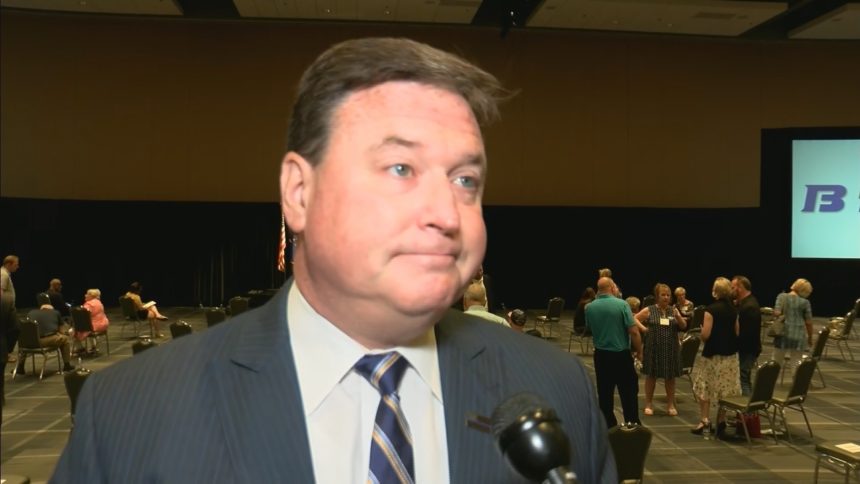by Casey Smith, Indiana Capital Chronicle
September 18, 2023
Todd Rokita on Monday became Indiana’s second consecutive attorney general brought up on disciplinary charges — this time related to his statements about an Indiana doctor in the summer of 2022.
The Indiana Supreme Court Disciplinary Commission filed three charges against Rokita, all related to breaches of confidentiality. It’s up to high court justices to determine whether any misconduct occurred and what, if any, sanction is warranted.
One of the allegations outlined in the disciplinary complaint states that Rokita improperly disclosed on national television last summer that his office was investigating Indianapolis OB-GYN Dr. Caitlin Bernard. Doing so could be deemed a violation of Indiana’s Rules of Professional Conduct, which prohibits such a disclosure if the investigation is still pending.
At the time of Rokita’s statements, the Bernard investigation was still pending, and a formal complaint against the doctor had not yet been filed with the Indiana Medical Licensing Board.
Story continues below.
The complaint additionally alleges that by publicly referring to Bernard as an “abortion activist acting as a doctor — with a history of failing to report,” Rokita broke a professional rule that bars attorneys from using means “that have no substantial purpose other than to embarrass, delay, or burden a third person.”
A third count contends that — because Rokita disclosed his office’s investigation into Bernard before making a referral to the Medical Licensing Board — he broke another professional rule that describes any lawyer’s actions that are “prejudicial to the administration of justice” as misconduct.
Rokita now has an opportunity to file a response.
Rokita’s conduct in question
Marion County Superior Court Judge Heather Welch ruled in December that the Republican attorney general violated the state licensing statute’s confidentiality provision when he disclosed his office was investigating Bernard. He made the public statements on Fox News before he filed a complaint against the doctor with the Medical Licensing Board.
Bernard performed an abortion on a 10-year-old rape survivor from Ohio in June 2022. Although she gave few identifying details when she told the Indianapolis Star about it, the case went national.
Rokita told Fox News commentator Jesse Watters last summer that his office was investigating Bernard, the Indiana abortion doctor who brought the case to light nationally. But he provided no details during the appearance.
“And then we have this abortion activist acting as a doctor with a history of failing to report. So we’re gathering the information,” Rokita said on air. “We’re gathering the evidence as we speak, and we’re going to fight this to the end, including looking at her licensure. If she failed to report it in Indiana, it’s a crime for – to not report, to intentionally not report.”
Rokita under investigation by disciplinary commission for statements about Indiana doctor
That summer, former Indiana University Maurer School of Law Dean Lauren Robel alleged that Rokita made “false or baseless” statements about Bernard. She filed a complaint with the disciplinary commission in July.
Robel further asserted to the disciplinary commission that Rokita did not retract those comments even after they were shown to be false.
“If he can throw the entire weight of his office without consequence to attack Dr. Bernard, he can do so to target any private citizen with whom he disagrees,” Robel wrote in a letter obtained by the Indiana Citizen. “This is the opposite of the rule of law.”
Indiana’s professional conduct for attorneys states that lawyers holding public office assume legal responsibilities “going beyond those of other citizens.” A lawyer’s abuse of public office “can suggest an inability to fulfill the professional role of lawyers.”
The rules instruct lawyers not to “make a false statement of material fact or law,” and instead “be truthful when dealing with others on a client’s behalf.”
Attorneys are additionally required to avoid “misrepresentations,” which can occur if a lawyer “incorporates or affirms a statement of another person that the lawyer knows is false.”
Misrepresentations can also occur when making “partially true but misleading statements or omissions that are the equivalent of affirmative false statements,” according to the attorney guidelines.
Lawyers who “engage in conduct involving dishonesty, fraud, deceit or misrepresentation” are in violation of the professional conduct rules and subject to discipline.
It has been rumored that numerous other grievances were also filed against Rokita, but none have been confirmed.
Bernard was ultimately disciplined by the Indiana Medical Licensing Bound earlier this year for mishandling the 10-year-old abortion patient’s information and violating patient privacy laws. The board declined to take action affecting Bernard’s ability to practice, however. Before the decision, she had never been disciplined by the licensing board.
Despite the legal victory, Rokita filed a lawsuit last week against Indiana University Health, where Bernard works, claiming the state’s largest hospital system did not properly enforce state and federal privacy laws in connection to abortion care provided by Bernard last summer.
A second AG in hot water
In May 2020, the Indiana Supreme Court suspended then-Attorney General Curtis Hill’s law license for 30 days after finding that Hill violated professional conduct rules and committed the criminal act of battery.
The court found that Hill groped four women, including one lawmaker and three legislative staffers, at an Indianapolis bar in March 2018 at a post-session social gathering. Hill adamantly denied the allegations during a four-day disciplinary hearing.
Myra Selby, a former Indiana Supreme Court justice who served as hearing officer in Hill’s case, had recommended a 60-day suspension. The court’s disciplinary commission recommended a two-year suspension.
Hill remained in office during his suspension but was not allowed to participate in legal matters. His chief deputy ran the office.
What happens next
When someone files a grievance against a lawyer with the Disciplinary Commission of the Indiana Supreme Court, the lawyer is contacted and is required to respond in writing to the complaint.
After that initial investigation, the commission’s executive director weighs if there is probable lawyer misconduct. If not, the grievance is dismissed and the case is never public. If the director believes there is, then the full disciplinary commission reviews the matter.
The full commission is a citizen board made up of seven lawyers and two non-lawyers. They are appointed by the Indiana Supreme Court.
If the commission believes that the lawyer has engaged in misconduct for which they should be disciplined, it files a complaint with the Clerk of the Supreme Court formally charging the lawyer with misconduct.
That is the point where a case becomes public. Preceding deliberations are not public record.
If the commission and the lawyer can agree to the facts of the case and an appropriate disciplinary sanction, a hearing can be avoided. The agreement is submitted to the Supreme Court for approval. If the Court accepts the agreement, the agreed sanction is imposed by the Supreme Court and the case is over. If not, there is a hearing.
Need to get in touch?
Have a news tip?
A hearing officer is then appointed by the Supreme Court to hear the evidence. The commission acts as prosecutor in the case and must prove its charges with a higher burden of proof than in a civil case. The hearing officer’s responsibilities are like those of a trial court judge, except that the hearing officer cannot make a final decision in the case.
The hearing officer makes a report on the case to the Supreme Court, which makes a final decision.
Sanctions depend on the seriousness of the case. Possible sanctions include:
a private or public reprimand;suspension from practice for a set period of time;suspension from practice with reinstatement only after the lawyer proves fitness; andpermanent disbarment.
The vast majority of grievances filed with the commission are dismissed. For instance, 1,270 grievances were filed during the 2022 fiscal year, according to the Indiana Supreme Court’s annual report. But only 16 complaints for disciplinary action were filed by the commission that same year.
The complaints alleged 26 counts of misconduct, and the Court later issued 57 final orders of discipline. Included was the suspension of one attorney for making knowingly false or reckless statements about a judge’s qualifications, according the annual report. Another lawyer was found to have mismanaged his attorney trust account and inadequately supervised a paralegal in one matter, and that he failed to respond timely to a disciplinary complaint in the other.
This story will be updated.
Indiana Capital Chronicle is part of States Newsroom, a network of news bureaus supported by grants and a coalition of donors as a 501c(3) public charity. Indiana Capital Chronicle maintains editorial independence. Contact Editor Niki Kelly for questions: info@indianacapitalchronicle.com. Follow Indiana Capital Chronicle on Facebook and Twitter.











